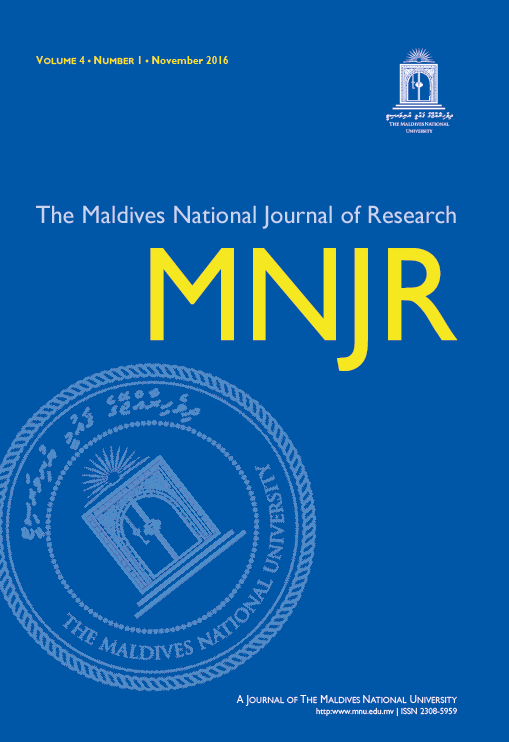Does context make a difference? School Leaders’ Perceptions of School Closures across the Maldives during COVID-19
DOI:
https://doi.org/10.62338/h9dzd290Keywords:
Policy implementation, School context, Educational Leadership, School autonomy, Contextual Decision-makingAbstract
Contextual features are crucial elements to consider in any decision-making process regarding a school’s teaching and learning processes. However, a lack of attention to specific contextual features is evident in educational policy decision-making. A qualitative case study across the Maldives revealed that school leaders’ primary concerns were students’ safety, completing the syllabus or curriculum, and the lack of consideration for a school’s context. The participants highlighted the importance of acknowledging the contextual realities of individual schools and involving stakeholders to make effective decisions regarding school operations. These findings have implications for educational policy decision-making, particularly under unprecedented circumstances.
References
Ali, A. (2006). A study of the cluster schools policy in the Maldives (Doctoral dissertation, Institute of Education, University of London).
Asian Development Bank. (2005). Maldives: Strengthening the framework of education towards vision 2020. Maldives: Ministry of Finance and Treasury.
Ball, S. J. (1994). Education reform: A critical and post-structural approach. Buckingham: Open University Press.
Berkhout, S. J., & Wielemans, W. (1999). Toward understanding education policy: An integrative approach. Educational Policy, 13(3), 402-420.
Braun, A., Ball, S. J., Maguire, M., & Hoskins, K. (2011). Taking context seriously: Towards explaining policy enactments in the secondary school. Discourse: Studies in the Cultural Politics of Education, 32(4), 585-596. doi:10.1080/01596306.2011.601555
Clarke, S., & O'Donoghue, T. (2017). Educational leadership and context: A rendering of an inseparable relationship. British Journal of Educational Studies, 65(2), 167-182. doi:10.1080/00071005.2016.1199772
Codd, J. A. (1988). The construction and deconstruction of educational policy documents. Journal of Education Policy, 3(3), 235-247. doi:10.1080/0268093880030303
Di Biase, R. (2018). Moving beyond the teacher-centred/learner-centred dichotomy: Implementing a structured model of active learning in the Maldives. Compare: A Journal of Comparative and International Education, 49(4), 565-583. doi:10.1080/03057925.2018.1435261
Di Biase, R. (2019). Enabling pedagogic reform in the Maldives: Implications for translating policy into teacher practice. Asia Pacific Journal of Education, 39(3), 372-390. doi:10.1080/02188791.2019.1603101
Fimyar, O. (2014). What is policy? in search of frameworks and definitions for non-western contexts. Educate~, 14(3), 6-21.
Gordon, I., Lewis, J., & Young, R. (1977). Perspectives on policy analysis. Public Administration Bulletin, 25, 26-35.
Government of Maldives. (2009). ‘Aneh dhivehi raajje’ The strategic action plan: National framework for development 2009 - 2013. Male', Maldives: The Government of Maldives.
Ministry of Education. (2009). GCE o'levelgai faasvaa minvaru mathikurun [increasing pass percentage in the GCE O' level examination]. Male', Maldives: Ministry of Education.
Ministry of Education. (2020a). Maldives education response plan for COVID-19. Male’ Maldives: Ministry of Education.
Ministry of Education. (2020b). Standard operation procedures on COVID -19. Male’, Maldives: Ministry of Education.
Ministry of Education, & Ministry of Higher Education. (2019). Maldives education sector plan: 2019-2023. Male’, Maldives:
National Bureau of Statistics. (2019). Household income and expenditure survey 2016. Maldives: National Bureau of Statistics. Retrieved from http://statisticsmaldives.gov.mv/household-income-expenditure-survey-2016/
National Institute of Education. (2014). National curriculum framework Retrieved from https://www.nie.edu.mv/index.php/en/national-curriculum/curriculum-framework
Nizaaru, A. (2020, May). Dharivarunnah internet dongle dheyn mashvaraakuranee. Mihaaru
Raab, C. D. (1994). Theorising the governance of education. British Journal of Educational Studies, 42(1), 6-22.
Rizvi, F., & Lingard, B. (2010). Globalizing education policy. London: Routledge. doi:https://doi.org/10.4324/9780203867396
Sabatier, P. A. (1986). Top-down and bottom-up approaches to implementation research: A critical analysis and suggested synthesis. Journal of Public Policy, 21-48.
Shafeeu, I. (2019a). Instructional leadership: Does it make a difference? Evidence from the Maldives. International Journal of Leadership in Education, 1-23. doi:10.1080/13603124.2019.1690697
Shafeeu, I. (2019). Relationship between Principals’ instructional leadership and school effectiveness. Does it make a difference? Evidence from the Maldives (Doctoral dissertation, Durham University).
Shougee, M., & Shareef, A. F. (2022). Non-state actors in education: Maldives past, present and future perspectives.
Thrupp, M., & Lupton, R. (2006). Taking school contexts more seriously: The social justice challenge. British Journal of Educational Studies, 54(3), 308-328. doi:10.1111/j.1467-8527.2006.00348.x
Yaameen, M. (2020, June). Thauleemee vuzaaraa: Hihvaru eluvaanulaa heydhakuri bura thinmas. Vaguthu
Zahra, H. (2020, July). COVID-19 pandemic – situation in the Maldives. SCMPCR. Newsletter



